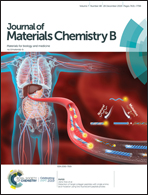Detection of target collagen peptides with single amino acid mutation using two fluorescent peptide probes†
Abstract
Collagen with a single amino acid substitution is the main cause of a plethora of heritable disorders such as Osteogenesis Imperfecta and Ehlers-Danlos syndrome. Though significant advances have been achieved in the development of protein assays, it remains very challenging to distinguish a protein with a single amino acid mutation from the wild-type protein. A novel fluorescent self-quenching assay has been constructed to detect target collagen peptides with a single amino acid mutation using two probe peptides. The hybridization of the probe peptide and the natural target collagen peptide results in a complete heterotrimer and strong fluorescence, whereas the mixture of the probe peptide and the mutation collagen sequences leads to a partial homotrimer and pronounced fluorescence self-quenching. The extent of fluorescence quenching is dependent on the identity of the residue replacing Gly following the order of Ala < Ser < Arg, while the Gly–Ala mutation causes the mildest fluorescence loss. The probe peptide-based fluorescence self-quenching assay facilitates specific detection of the target collagen sequence with a single Gly mutation at the nM level. The simultaneous utilization of both probe peptides enables efficient discrimination between different mutation peptides. To our knowledge, our work may be the first report of a robust analytical assay that can identify collagen fragments with single amino acid mutation, which will greatly contribute to deciphering the molecular mechanism of Osteogenesis Imperfecta as well as developing novel diagnostic strategies.



 Please wait while we load your content...
Please wait while we load your content...